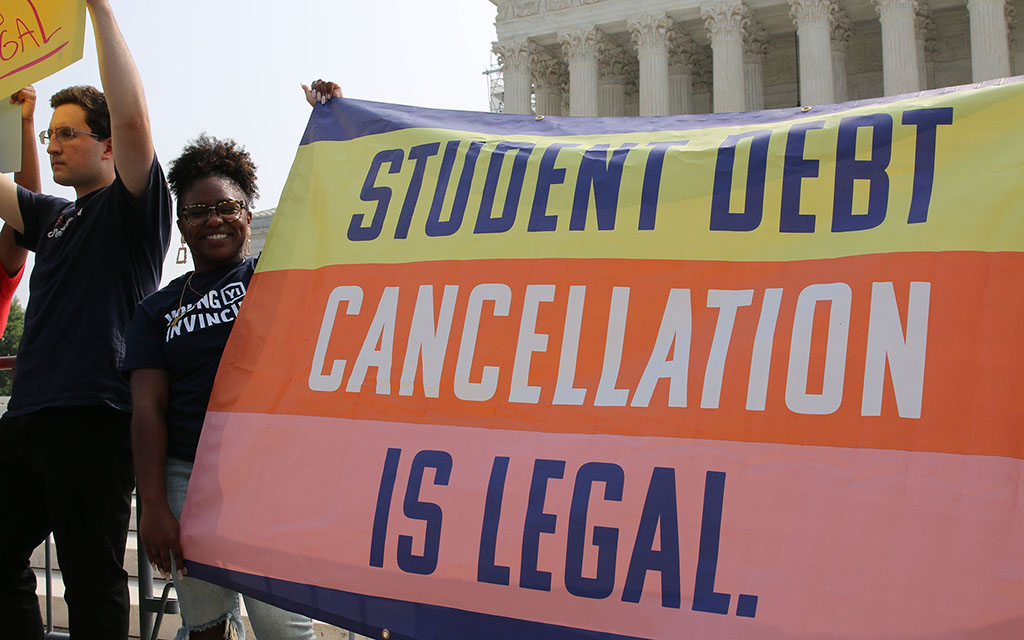WASHINGTON – The Biden administration said Wednesday that it has cleared the way for another $9 billion in student debt relief for as many as 125,000 borrowers – 11,700 of them in Arizona.
The savings, which will come through changes to existing debt relief programs, would save Arizona borrowers an estimated $840 million, according to the Education Department. Advocates said that will likely come as good news to the 917,300 borrowers in the state who owed $32.5 billion as of June 30, according to department data.
“I’ve heard so many stories from across our district about the weight of these student loans,” Rep. Raul Grijalva, D-Tucson, said in a statement Wednesday. “Today’s announcement gives more than 11,000 Arizonans a huge sigh of relief.”
The announcement is the latest in an ongoing effort to assemble a scaled-down debt relief plan for student borrowers, after the Supreme Court in June struck down a sweeping administration plan that would have saved 40 million Americans an estimated $40 billion.
The court ruled that the Biden administration exceeded its authority with its original plan to cancel $20,000 in student loan debt for borrowers who made less than $125,000 individually or $250,000 jointly.
President Joe Biden said Wednesday that since that ruling he has been “pursuing a new approach” to debt relief by utllizing the Higher Education Act, which allows the secretary of Education to “compromise, waive, or release loans” under specific circumstances.
“With the latest debt … cancellation in total, my administration has canceled $127 billion in student debts for nearly 3.6 million Americans,” Biden said in a White House briefing Wednesday.
The latest changes include improvements to the income-driven repayment program and the Public Service Loan Forgiveness program, which have been in place for years.
Under the IDR, borrowers’ payments could be capped based on their income and any remaining debt could be forgiven after 20 years of regular payments. Balances may now be forgiven after 10 years of regular debt payment. The public service program relieves debt for those who go into public service careers, but Biden said that bureaucratic red tape had limited its use to just a fraction of those eligible.
Mary Kusler, senior director of the National Education Association’s Center for Advocacy and Political Action, said the administration was smart to turn to the Higher Education Act to ensure borrowers’ futures by working with Education Secretary Miguel Cardona.
“Secretary Cardona is sitting down with stakeholders from across the board to really try to put a pen to paper and come up with the best ways that they’re providing this necessary relief,” Kusler said.
She said debt relief is important to ensure “that Americans are not dragged down by their student loan debt, but rather lifted up for their futures.”
Loan forgiveness not only benefits borrowers, but can have an impact on the larger economy, said Dennis Hoffman, an Arizona State University economics professor and director of the Seidman Research Center at the W.P. Carey School of Business.
Student debt forgiveness “would enable them (borrowers) to redirect the payment to things like automobile loans, housing loans, just … get by day to day,” Hoffman said.
He said that debt relief will bolster Arizona’s economy, which he says has been historically dependent on the real estate sector.
“Injecting cash or liquidity into the family budgets of this group of people will then help them afford a housing payment,” Hoffman said. “The high interest rates are going to be a barrier but this will be, you know, some added relief.”
While relieving current debt is important, Hoffman said there need to be assurances that future generations can budget for college.
“I don’t know what the plan is,” he said. “How are we going to finance issuing new student loans going forward? I think that’s actually a question that needs to be asked.”
Kusler agrees that it’s important to think about long-term solutions for student debt rather than a temporary fix.
“It’s not even just a conversation about those who have already taken on the loan and the debt,” she said. “We have to be addressing this from a whole scale aspect, so that these next generations coming through can afford their dream as well.”



